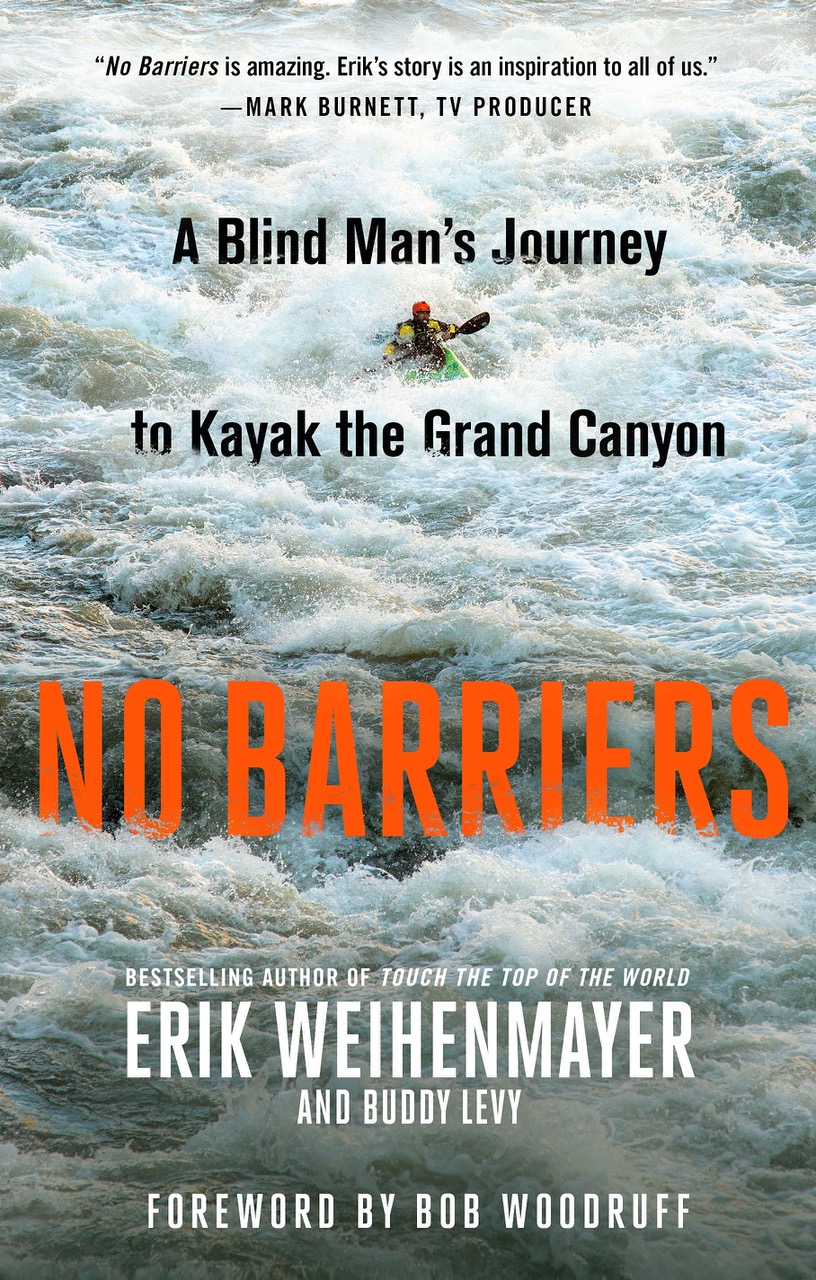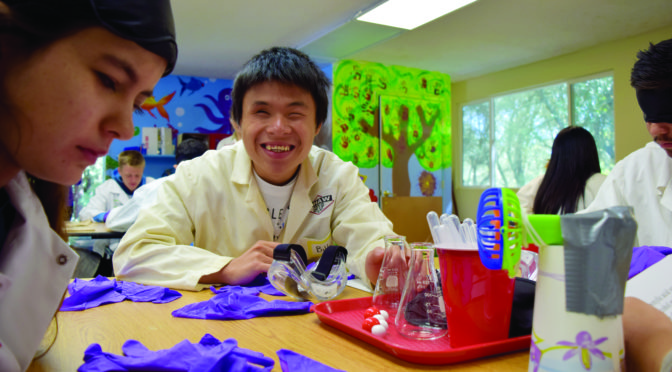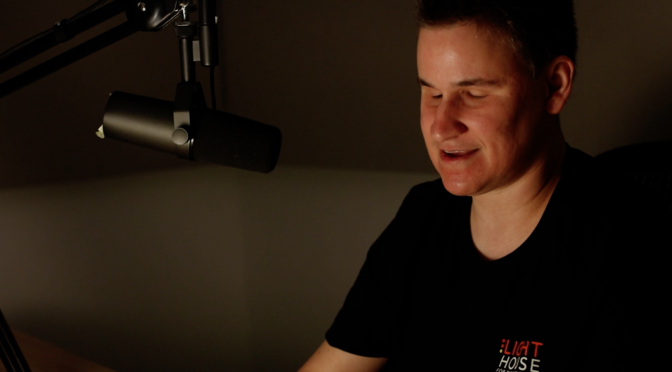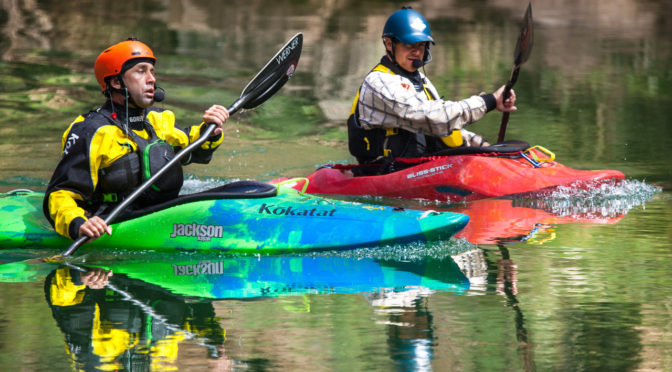 On May 2, we’re welcoming blind explorer Erik Weihenmayer as our guest for the next installment of LightHouse Listenings — a live event “for ears only”. Erik will join Davia Nelson of NPR’s The Kitchen Sisters for a candid conversation about his work as an athlete, adventurer, author, activist and motivational speaker, as well as his new book (relaunched April 24) No Barriers.
On May 2, we’re welcoming blind explorer Erik Weihenmayer as our guest for the next installment of LightHouse Listenings — a live event “for ears only”. Erik will join Davia Nelson of NPR’s The Kitchen Sisters for a candid conversation about his work as an athlete, adventurer, author, activist and motivational speaker, as well as his new book (relaunched April 24) No Barriers.
Many of us are familiar with Weihenmayer’s worldly feats — climbing Mount Everest and kayaking the Grand Canyon, to name two. But while it’s easy to focus on the dazzling peaks (literal and figurative) of Erik’s achievements, this doesn’t leave much room to talk about the nitty gritty, behind-the-scenes of traveling the world as a blind person. What goes into planning a trip like this? How do you ignore the haters? What silly things has he forgotten?
With our Holman Prize semifinalists filling out their proposals and preparing to embark on adventures of their own, we decided to grill Erik for more than just lofty inspiration. The Holman Prize Team collected some practical advice for blind travelers including fully immersing yourself in the experience, getting to know the currency and occasionally making time to do some adventuring in your very own backyard.
Here’s the full conversation:
Holman: When putting together the trip of a lifetime, how long should you take to research and plan? Any rule of thumb for time spent planning versus the actual execution?
Erik: What gets attention, and what people remember, is the summit, the big rapid or whatever that “apex” is – but I don’t think people realize for every hour of summiting, there’s a hundred hours of tedious planning. It’s sitting behind the computer writing everyone you know, trying to raise money, trying to understand the business side of how to make it happen, promoting it in the right way, and all the tedious hours that go into training.
Holman: When you walk out the door, what do you most often forget?
Erik: First of all, when I get on the plane I feel relief, I take a nap. One of the hardest parts – the planning – is over. Now it’s just put your plan into place – execute well, and that’s completely different from all the planning, all the worrying, all the anxiety, all the orchestration. You get on that plane and you’re like, ok, stage one of the adventure is done.
That being said, I’ve forgotten all kinds of things – even socks. Imagine going up Mount Everest and realizing “Oh my god! I thought you were going to bring all the socks!” and then you have four pairs of socks for going all the way up the mountain. Then there we were, looking for yak-wool socks in the markets of Namche Bazaar, and trust me, those aren’t as warm as SmartWool.
I’ve forgotten books. When you’re blind, and you’re not really getting stimulation from looking out the window, sometimes you need a good book to help you – with jet lag especially. If you have insomnia don’t forget those books, or music, or podcasts or whatever you need.
One thing I tell people is to be careful to separate the experience itself from the promotion of the experience. Of course you have to send out the travel blog or the video or the Facebook update, and that stuff’s important to spread the message, but there has to be a very clear line. You have to be ready to immerse yourself in the experience, and that’s a tricky thing in the modern world – being there to actually be there, not for your résumé.
Holman: What are the cultural considerations of traveling around the world as a blind person? Any tools you recommend for assimilating when moving from country to country? Any must-have items, besides the obvious?
Erik: In the developing countries I’ve been in, bringing a dog would be really hard. It’s kind of you and your cane. Going from America to a developing country, people don’t know about blindness. The blind people in their communities maybe don’t come out as much. In many places, blind people stay in their huts, cook, and are sheltered.
I went to Russia once and was getting ready to speak at a bank. All the people with different challenges – blind people, wheelchair riders, etc. – would come up in my talk, and they told me ‘You will shock people if you talk about them, because we don’t see those people in our culture.’ They’re hidden away.
For that reason, definitely try to connect with the local blindness organization. Stop in and share knowledge. When I was in Katmandu, I went to the association and it was great, we had lunch together and talked. It was wonderful.
Always go knowledgeable. Learn the money, learn how to identify the money. And if you speak the language, you are golden. If you know the language, then everyone is relying on you to translate and you’re getting pushed to the front to talk and interact with the local people.
Understand that when you go into one of these not-first world countries, there’s chaos. You’re stepping in pig poop, there’s open gutters with sewage, and it’s not ADA compliant. But that’s part of what makes it fun, too. I remember walking through the streets of Katmandu and a guy came by on his moped, and literally his moped bumped me. His hot tail pipe burned my leg. It wasn’t a disaster, you just have to be able to handle these sorts of inconveniences.
Holman: When traveling, how do you keep track of your story? Do you take notes, keep a journal, or somehow otherwise keep track of your milestones with a physical inventory, or do you keep it all in your head?
Erik: Everybody’s different, but writing in a journal throughout the trip is really great. Even bring a digital recorder and just jot notes down or turn it on and capture an experience you might want to remember later. And if everyone takes a journal, then you can go back and read everyone else’s, too. It become a collective consciousness type of thing. If you plan on writing about the experience, you can’t beat a firsthand account of how you were feeling on any given day.
Holman: Ever been an amazing adventure in your own community?
Erik: There’s incredible adventure all around us. Recently my wife and I rode our tandem bike up to this ghost town called Animas Forks, and explored all the old buildings where these miners lived through the harshest of winters. I went to South Carolina last year, to Beaufort, and we took a tour, learned about this language, almost like a separate language that the African-American culture spoke, based on their language from Ghana. There are incredible cultures and adventure right under our noses, you don’t necessarily have to go to the other side of the world.
Holman: Is it more important to do something first or do something best?
Erik: It depends on what your goal is. I’ve never looked at adventure in terms of “hey, I survived it!” The point of these adventures isn’t just to survive. You don’t learn anything from being in a survival stage. You want to be ready. I think it’s more important to take the time to flourish in these environments or cultures. What you’re trying to do is learn things.
If you can prepare for something, and be first, it’s pretty fun, but at the same time, you can be a pioneer without being the first. Because pioneering is mostly in your mind. It’s not about being the first “out there,” as long as it’s a meaningful experience for you. It’s icing on the cake – but it’s not quite enough in itself.
Holman: If people don’t believe in your ability to do something, how do you proceed?
Erik: It’s a tricky one, because even though I’ve done a lot of big cool things in my life, I may be sitting in the airport trying to figure out how to get on the right bus. You’re still a human being, and still confused in that moment. It’s ok to ask for help and accept help.
It is a balancing act of accepting help and also being practical about what you can do and what you don’t need help with. Honestly, people could argue with this, but getting out there and flailing and bleeding is perfectly acceptable. People want to immediately grab you, and help you, people don’t want to see that flailing. You tap someone’s foot with the cane and they freak out. You have to say “No, that’s how the cane works.”
I think that you’re teaching by being out there and being positive. If you become the grumpy blind guy, you’ve lost. You’ve got to be graceful, and be the consummate ambassador, and if you’re lucky enough to have the time to educate people, do it in a nice way.
Meet Erik at LightHouse Headquarters on May 2 for his talk at 7:00 p.m. Reception begins at 6:00 p.m., with complimentary wine and beer included in your ticket.
The cost is $10 in advance and $15 at the door (cash only). Tickets can be purchased through our Eventbrite page.
If you are unable to buy your ticket via Eventbrite, contact Events Manager Dagny Brown at events@lighthouse-sf.org or 415-694-7333.




 On May 2, we’re welcoming blind explorer Erik Weihenmayer as our guest for the
On May 2, we’re welcoming blind explorer Erik Weihenmayer as our guest for the